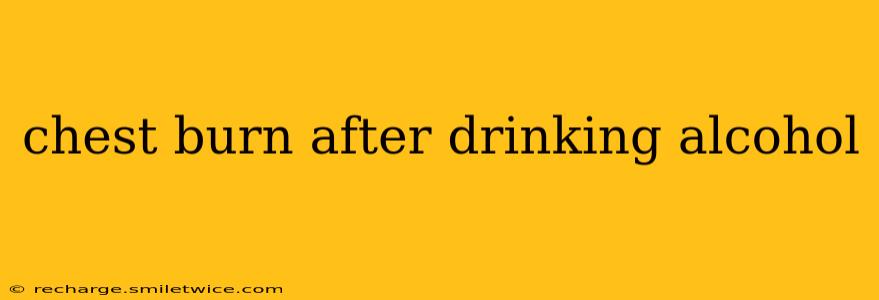Experiencing chest burn after drinking alcohol is a common complaint, often leaving individuals uncomfortable and seeking relief. This burning sensation, frequently described as heartburn, is typically caused by alcohol's effects on the digestive system. Understanding the underlying mechanisms and implementing preventative measures can significantly improve your experience after enjoying alcoholic beverages.
What Causes Chest Burn After Drinking Alcohol?
Alcohol consumption can trigger chest burn through several pathways. The most prominent is its effect on the lower esophageal sphincter (LES). This muscle acts as a valve between the esophagus and stomach, preventing stomach acid from flowing back up into the esophagus. Alcohol relaxes the LES, allowing stomach acid to reflux, causing that familiar burning sensation in the chest.
Furthermore, alcohol can irritate the lining of the esophagus directly, exacerbating the burning feeling. It also stimulates the stomach to produce more acid, increasing the amount available for reflux. The higher the alcohol content of the beverage, the more pronounced these effects tend to be.
How Long Does Chest Burn from Alcohol Last?
The duration of alcohol-induced chest burn varies depending on several factors including the amount of alcohol consumed, the individual's sensitivity, and the type of alcoholic beverage. For some, the burning sensation may subside within a few hours, while for others, it can persist for longer. If the chest burn is severe or persistent, it's crucial to consult a doctor.
What Can I Do to Relieve Chest Burn After Drinking?
Many home remedies can offer temporary relief from alcohol-induced chest burn. These include:
- Antacids: Over-the-counter antacids neutralize stomach acid, providing quick relief.
- Lifestyle Changes: Avoiding trigger foods, maintaining a healthy weight, and elevating the head of your bed can help prevent future episodes.
- Dietary Adjustments: Eating smaller, more frequent meals can reduce the burden on your digestive system.
Can Certain Alcoholic Drinks Cause More Chest Burn Than Others?
Yes, certain alcoholic drinks are more likely to trigger chest burn than others. Darker liquors like whiskey, bourbon, and red wine often contain compounds that can irritate the stomach lining and worsen reflux. Carbonated alcoholic beverages can also exacerbate the problem due to their gas content.
What Are the Long-Term Effects of Alcohol on the Esophagus?
Chronic alcohol consumption can lead to serious long-term complications, including esophagitis (inflammation of the esophagus) and Barrett's esophagus, a precancerous condition. These conditions highlight the importance of moderation and mindful consumption of alcohol.
Is Chest Burn After Drinking Alcohol a Sign of a More Serious Problem?
While occasional chest burn after drinking is usually benign, persistent or severe chest pain, especially if accompanied by other symptoms such as difficulty swallowing or weight loss, should prompt a visit to the doctor. These symptoms could indicate a more serious underlying condition.
How Can I Prevent Chest Burn From Alcohol?
Prevention is key. Consider the following strategies:
- Moderate Consumption: Limiting alcohol intake significantly reduces the risk of chest burn and other related problems.
- Drink Slowly: Sipping your drinks rather than gulping them allows your body to process the alcohol more gradually.
- Eat Before Drinking: A meal before drinking can help buffer the stomach acid and reduce the impact of alcohol on the LES.
- Stay Hydrated: Drinking plenty of water helps dilute the alcohol and supports healthy digestion.
By understanding the causes of chest burn after drinking alcohol and adopting preventative measures, you can minimize discomfort and protect your long-term health. Remember that if your symptoms are severe or persistent, it's essential to seek medical advice.
